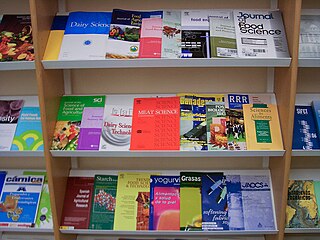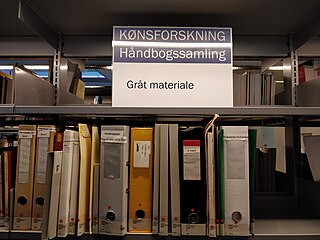
In academic publishing, a scientific journal is a periodical publication designed to further the progress of science by disseminating new research findings to the scientific community. These journals serve as a platform for researchers, scholars, and scientists to share their latest discoveries, insights, and methodologies across a multitude of scientific disciplines. Unlike professional or trade magazines, scientific journals are characterized by their rigorous peer review process, which aims to ensure the validity, reliability, and quality of the published content. With origins dating back to the 17th century, the publication of scientific journals has evolved significantly, playing a pivotal role in the advancement of scientific knowledge, fostering academic discourse, and facilitating collaboration within the scientific community.
Joseph Gelfer is a British author and academic. He is noted for his academic analysis of spiritual and religious topics and masculinity. His book 2012: Decoding the Countercultural Apocalypse attracted considerable media attention.

Academic publishing is the subfield of publishing which distributes academic research and scholarship. Most academic work is published in academic journal articles, books or theses. The part of academic written output that is not formally published but merely printed up or posted on the Internet is often called "grey literature". Most scientific and scholarly journals, and many academic and scholarly books, though not all, are based on some form of peer review or editorial refereeing to qualify texts for publication. Peer review quality and selectivity standards vary greatly from journal to journal, publisher to publisher, and field to field.

An academic journal or scholarly journal is a periodical publication in which scholarship relating to a particular academic discipline is published. They serve as permanent and transparent forums for the presentation, scrutiny, and discussion of research. They nearly universally require peer review for research articles or other scrutiny from contemporaries competent and established in their respective fields.

Open access (OA) is a set of principles and a range of practices through which research outputs are distributed online, free of access charges or other barriers. With open access strictly defined, or libre open access, barriers to copying or reuse are also reduced or removed by applying an open license for copyright.

The Social Science Research Network (SSRN) is a repository for preprints devoted to the rapid dissemination of scholarly research in the social sciences, humanities, life sciences, and health sciences, among others. Elsevier bought SSRN from Social Science Electronic Publishing Inc. in May 2016. It is not an electronic journal, but rather an eLibrary and search engine.
Male privilege is the system of advantages or rights that are available to men on the basis of their sex. A man's access to these benefits may vary depending on how closely they match their society's ideal masculine norm.
PubMed Central (PMC) is a free digital repository that archives open access full-text scholarly articles that have been published in biomedical and life sciences journals. As one of the major research databases developed by the National Center for Biotechnology Information (NCBI), PubMed Central is more than a document repository. Submissions to PMC are indexed and formatted for enhanced metadata, medical ontology, and unique identifiers which enrich the XML structured data for each article. Content within PMC can be linked to other NCBI databases and accessed via Entrez search and retrieval systems, further enhancing the public's ability to discover, read and build upon its biomedical knowledge.

Self-archiving is the act of depositing a free copy of an electronic document online in order to provide open access to it. The term usually refers to the self-archiving of peer-reviewed research journal and conference articles, as well as theses and book chapters, deposited in the author's own institutional repository or open archive for the purpose of maximizing its accessibility, usage and citation impact. The term green open access has become common in recent years, distinguishing this approach from gold open access, where the journal itself makes the articles publicly available without charge to the reader.

Grey literature is materials and research produced by organizations outside of the traditional commercial or academic publishing and distribution channels. Common grey literature publication types include reports, working papers, government documents, white papers and evaluations. Organizations that produce grey literature include government departments and agencies, civil society or non-governmental organizations, academic centres and departments, and private companies and consultants.
The mythopoetic men's movement was a body of self-help activities and therapeutic workshops and retreats for men undertaken by various organizations and authors in the United States from the early 1980s through the 1990s. The term mythopoetic was coined by professor Shepherd Bliss in preference to the term "New Age men's movement". Mythopoets adopted a general style of psychological self-help inspired by the work of Robert Bly, Robert A. Johnson, Joseph Campbell, and other Jungian authors. The group activities used in the movement were largely influenced by ideas derived from Swiss psychiatrist Carl Gustav Jung, known as Jungian psychology, e.g., Jungian archetypes, from which the use of myths and fairy tales taken from various cultures served as ways to interpret challenges facing men in society.
Michael G. Flood is an Australian sociologist and a professor at the Queensland University of Technology School of Justice. Flood gained his doctorate in gender and sexuality studies from the Australian National University. His areas of research are on violence against women, fathering, pro-feminism, domestic violence, the effects of pornography on young people, safe sex among heterosexual men, men's movements as a backlash to the feminist movement, men's relationships with each other and with women, homophobia, men's health, and gender justice. He is a regular contributor to and is regularly quoted in the media on these and other issues.

PLOS One is a peer-reviewed open access mega journal published by the Public Library of Science (PLOS) since 2006. The journal covers primary research from any discipline within science and medicine. The Public Library of Science began in 2000 with an online petition initiative by Nobel Prize winner Harold Varmus, formerly director of the National Institutes of Health and at that time director of Memorial Sloan–Kettering Cancer Center; Patrick O. Brown, a biochemist at Stanford University; and Michael Eisen, a computational biologist at the University of California, Berkeley, and the Lawrence Berkeley National Laboratory.
Scholarly communication involves the creation, publication, dissemination and discovery of academic research, primarily in peer-reviewed journals and books. It is “the system through which research and other scholarly writings are created, evaluated for quality, disseminated to the scholarly community, and preserved for future use." This primarily involves the publication of peer-reviewed academic journals, books and conference papers.

The Society for Scientific Exploration (SSE) is a group committed to studying fringe science. The opinions of the organization in regard to what are the proper limits of scientific exploration are often at odds with those of mainstream science. Critics argue that the SSE is devoted to disreputable ideas far outside the scientific mainstream.
The Electronic Journal of Sociology was an online open access academic journal of sociology. It was established in 1994 by Michael Sosteric. Andreas Scheider was editor-in-chief until 2004, when Sosteric returned and Adam Rafalovich became co-editor-in-chief. The journal implemented a new approach in 2004 whereby it decided to publish three tiers of articles: fully reviewed original articles at tier 1, editorially-reviewed reviews and commentaries at tier 2, and editorially-reviewed other works, including original papers, at tier 3. Although the journal "achieved international recognition", as an electronic journal it faced barriers.

"Who's Afraid of Peer Review?" is an article written by Science correspondent John Bohannon that describes his investigation of peer review among fee-charging open-access journals. Between January and August 2013, Bohannon submitted fake scientific papers to 304 journals owned by fee-charging open access publishers. The papers, writes Bohannon, "were designed with such grave and obvious scientific flaws that they should have been rejected immediately by editors and peer reviewers", but 60% of the journals accepted them. The article and associated data were published in the 4 October 2013 issue of Science as open access.
An open-access monograph is a scholarly publication usually made openly available online with an open license. These books are freely accessible to the public, typically via the internet. They are part of the open access movement.

The idea and practise of providing free online access to journal articles began at least a decade before the term "open access" was formally coined. Computer scientists had been self-archiving in anonymous ftp archives since the 1970s and physicists had been self-archiving in arXiv since the 1990s. The Subversive Proposal to generalize the practice was posted in 1994.
The Journal of Management, Spirituality & Religion (JMSR) is a peer-reviewed academic journal on management, spirituality and religion. It is published six times per year and contains scholarly articles regarding the spiritual and religious aspects of managing and organizing. The journal was established in 2004 and published by Routledge until January 2021. The editor-in-chief is Kathryn Pavlovich.










